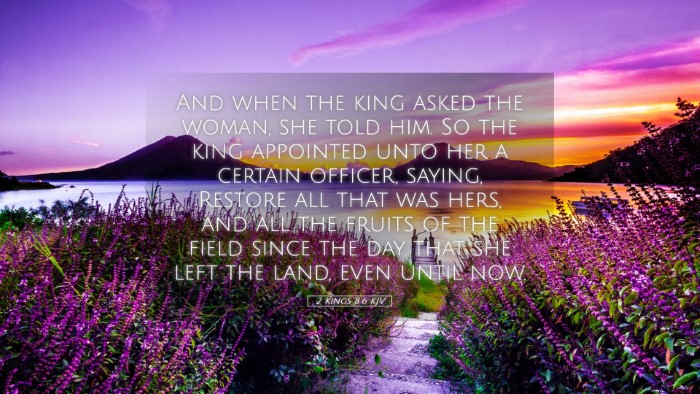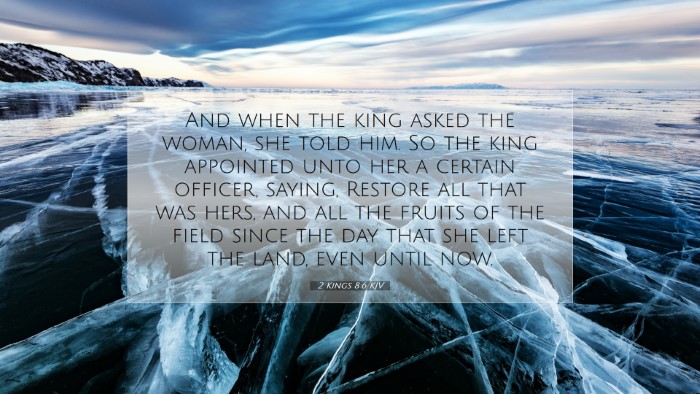Commentary on 2 Kings 8:6
2 Kings 8:6 states, "And when the king asked the woman, she told him. So the king appointed a certain officer for her, saying, 'Restore all that was hers, and all the proceeds of the field from the day that she left the land until now.' This verse captures a significant moment in the narrative of the Old Testament, tying together themes of divine providence, restoration, and justice.
Analysis of 2 Kings 8:6
This passage occurs within the context of the story of the Shunammite woman, who had previously shown great hospitality to the prophet Elisha. When a famine arose, she left her land and took refuge in the land of the Philistines. Upon her return, she seeks justice for her lost property.
Contextual Background
- The Shunammite Woman: A faithful servant of God who received Elisha's blessing and miraculous aid during a time of personal crisis.
- The Role of the King: Signifies the authority of the monarch to right the wrongs done to his subjects, reflecting the biblical principle of justice.
- Divine Providence: The narrative demonstrates God’s provision for those who honor Him and act faithfully, as reflected in the restoration of the Shunammite woman’s estate.
Insights from Public Domain Commentaries
Matthew Henry's Commentary
Matthew Henry emphasizes the profound mercy of God in this passage. He notes that the king’s inquiry into the woman's situation resulted in her being restored not only to her property but also receiving the income that she had lost during her time away. This illustrates God's justice and the importance of recognizing the oppressed. Henry points out that the royal decree serves both as a recognition of the Shunammite woman's faith and as a public statement on the need for fairness in society.
Albert Barnes' Notes on the Bible
Albert Barnes reflects on the significance of the king being prompted to ask the woman about her situation. This inquiry showcases the positive influence Elisha had on the king, possibly indicating that the king's heart was moved towards justice. Barnes clarifies that the action taken by the king was a response to the woman's appeals, reinforcing the idea that divine intervention often comes through earthly authorities informed by godly counsel.
Adam Clarke's Commentary
Adam Clarke delves into the details of the restoration process—both the return of property and the reimbursement of profits. He states that such acts reveal the benevolent characteristic of leaders who are influenced by divine wisdom. Clarke also notes the historical context of land ownership in Israel and the importance of the king's role in ensuring that such ownership is honored and returned. Furthermore, Clarke highlights the transformative power of God at work in the mundane affairs of life, showing that He cares about justice on both a small and large scale.
Theological Implications
This verse is rich with theological implications and applications for modern faith communities. It raises questions about how believers respond to loss and injustice. The narrative demonstrates that God's providence may manifest through earthly authorities, suggesting that Christians should seek to engage meaningfully with societal structures to promote justice and restoration.
- Restoration: God desires to restore what has been lost, be it spiritually, materially, or emotionally.
- Justice: Believers are called to advocate for justice, recognizing that God acts through human authorities.
- Influence of the Faithful: The faithfulness of one can impact the actions of many, exemplified in the king's response to the Shunammite woman.
Conclusion
2 Kings 8:6 serves as a powerful reminder of God’s justice and mercy. The responses of the king, the woman, and the prophet Elisha illustrate the unfolding of divine providence in the lives of ordinary people. As students, scholars, and pastors reflect on this passage, they are encouraged to witness how God operates through history and within individual lives, restoring what has been lost and providing for His people.


